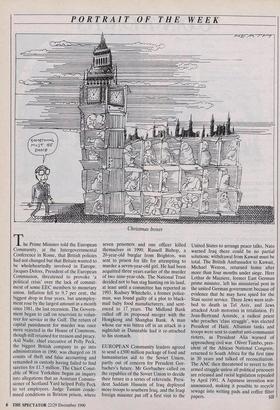PORTRAIT OF THE WEEK
Christmas boxes
The Prime Minister told the European Community, at the Intergovernmental Conference in Rome, that British policies had not changed but that Britain wanted to be wholeheartedly involved in Europe. Jacques Delors, President of the European Commission, threatened to provoke 'a political crisis' over the lack of commit- ment of some EEC members to monetary union. Inflation fell to 9.7 per cent, the biggest drop in four years, but unemploy- ment rose by the largest amount in a month since 1981, the last recession. The Govern- ment began to call on reservists to volun- teer for service in the Gulf. The return of capital punishment for murder was once more rejected in the House of Commons, though still retained for treason and piracy. Asil Nadir, chief executive of Polly Peck, the biggest British company to go into administration in 1990, was charged on 18 counts of theft and false accounting and remanded in custody having failed to find sureties for £1.5 million. The Chief Const- able of West Yorkshire began an inquiry into allegations that an Assistant Commis- sioner of Scotland Yard helped Polly Peck to vet employees. Judge Tumim conde- mned conditions in Brixton prison, where seven prisoners and one officer killed themselves in 1990. Russell Bishop, a 20-year-old burglar from Brighton, was sent to prison for life for attempting to murder a seven-year-old girl. He had been acquitted three years earlier of the murder of two nine-year-olds. The National Trust decided not to ban stag hunting on its land, at least until a committee has reported in 1993. Rodney Whitchelo, a former police- man, was found guilty of a plot to black- mail baby food manufacturers, and sent- enced to 17 years. The Midland Bank called off its proposed merger with the Hongkong and Shanghai Bank. A man whose ear was bitten off in an attack in a nightclub in Dunstable had it re-attached to his stomach.
EUROPEAN Community leaders agreed to send a £500 million package of food and humanitarian aid to the Soviet Union, partly out of concern for President Gor- bachev's future. Mr Gorbachev called on the republics of the Soviet Union to decide their future in a series of referenda. Presi- dent Saddam Hussein of Iraq deployed more troops to southern Iraq, and the Iraqi foreign minister put off a first visit to the United States to arrange peace talks. Nato warned Iraq there could be no partial solutions: withdrawal from Kuwait must be total. The British Ambassador to Kuwait, Michael Weston, returned home after more than four months under siege. Herr Lothar de Maiziere, former East German prime minister, left his ministerial post in the united German government because of evidence that he may have spied for the Stasi secret service. Three Jews were stab- bed to death in Tel Aviv, and Jews attacked Arab motorists in retaliation. Fr Jean-Bertrand Aristide, a radical priest who preaches 'class struggle', was elected President of Haiti. Albanian tanks and troops were sent to combat anti-communist rioters, as President Alia warned of approaching civil war. Oliver Tambo, pres- ident of the African National Congress, returned to South Africa for the first time in 30 years and talked of reconciliation. The ANC then threatened to revert to the armed struggle unless all political prisoners are released and racial legislation repealed by April 1991. A Japanese invention was announced, making it possible to recycle sewage into writing pads and coffee filter


































































































 Previous page
Previous page